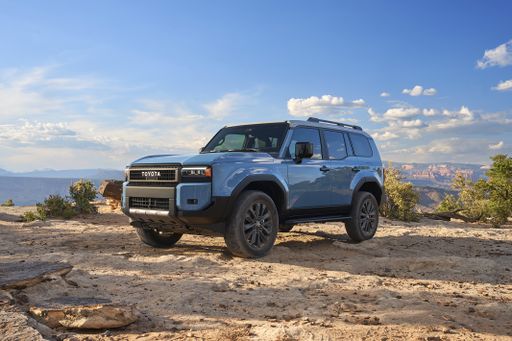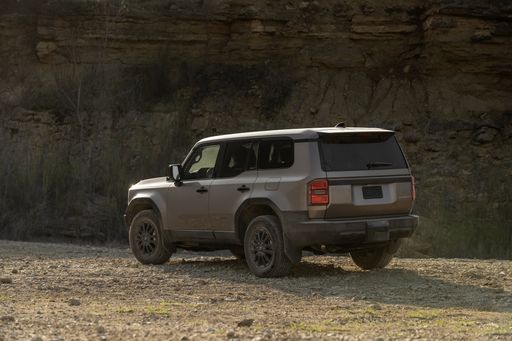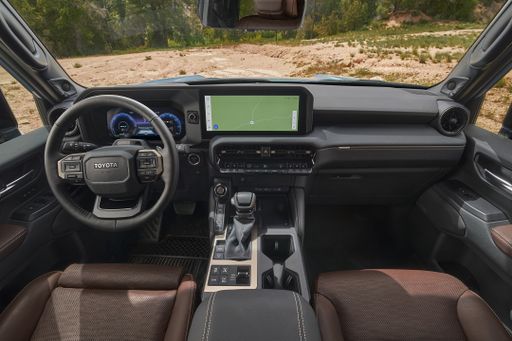Toyota Land Cruiser vs VW Transporter Transporter – Performance, range & efficiency compared
Costs and Efficiency:
Price and efficiency are key factors when choosing a car – and this is often where the real differences emerge.
VW Transporter Transporter has a decisively advantage in terms of price – it starts at 37500 £, while the Toyota Land Cruiser costs 70700 £. That’s a price difference of around 33190 £.
Fuel consumption also shows a difference: VW Transporter Transporter manages with 7.10 L and is therefore clearly more efficient than the Toyota Land Cruiser with 10.60 L. The difference is about 3.50 L per 100 km.
Engine and Performance:
Under the bonnet, it becomes clear which model is tuned for sportiness and which one takes the lead when you hit the accelerator.
When it comes to engine power, the VW Transporter Transporter has a distinct edge – offering 286 HP compared to 205 HP. That’s roughly 81 HP more horsepower.
In acceleration from 0 to 100 km/h, the VW Transporter Transporter is significantly quicker – completing the sprint in 7.40 s, while the Toyota Land Cruiser takes 12.30 s. That’s about 4.90 s faster.
In terms of top speed, the Toyota Land Cruiser performs somewhat better – reaching 170 km/h, while the VW Transporter Transporter tops out at 150 km/h. The difference is around 20 km/h.
There’s also a difference in torque: Toyota Land Cruiser pulls somewhat stronger with 500 Nm compared to 415 Nm. That’s about 85 Nm difference.
Space and Everyday Use:
Whether family car or daily driver – which one offers more room, flexibility and comfort?
Seats: Toyota Land Cruiser offers clearly perceptible more seating capacity – 7 vs 5.
In curb weight, VW Transporter Transporter is distinct lighter – 1872 kg compared to 2610 kg. The difference is around 738 kg.
When it comes to payload, VW Transporter Transporter decisively takes the win – 1259 kg compared to 540 kg. That’s a difference of about 719 kg.
Who comes out on top?
Overall, the VW Transporter Transporter shows itself to be dominates this comparison and secures the title of DriveDuel Champion.
It convinces with the more balanced overall package and proves to be the more versatile choice for everyday use.
Costs and Consumption
View detailed analysis
Engine and Performance
View detailed analysis
Dimensions and Body
View detailed analysis

VW Transporter Transporter
Toyota Land Cruiser
The Toyota Land Cruiser is the kind of SUV that makes you feel ready to abandon the map and take the long way home, with legendary go-anywhere capability wrapped in reassuringly solid build quality. Inside it's surprisingly comfortable and grown-up — a practical luxury for buyers who want reliability and presence rather than fleeting flash.
details @ Toyota Motor Corporation
@ Toyota Motor Corporation
 @ Toyota Motor Corporation
@ Toyota Motor Corporation
 @ Toyota Motor Corporation
@ Toyota Motor Corporation
VW Transporter Transporter
The VW Transporter is the workhorse of the modern tradesman, blending practical cleverness with a cabin that's actually pleasant to spend a long day in. It may not steal the style spotlight, but its unshowy durability, clever load solutions and easy-to-live-with character make it a sensible pick for businesses and weekend projects alike.
details
 @ Toyota Motor Corporation
@ Toyota Motor Corporation
|
|
|
|
|
Costs and Consumption |
|
|---|---|
|
Price
70700 - 79300 £
|
Price
37500 - 60800 £
|
|
Consumption L/100km
10.6 - 10.8 L
|
Consumption L/100km
7.1 - 8.4 L
|
|
Consumption kWh/100km
-
|
Consumption kWh/100km
21.9 - 24.4 kWh
|
|
Electric Range
-
|
Electric Range
56 - 331 km
|
|
Battery Capacity
-
|
Battery Capacity
11.8 - 63.8 kWh
|
|
co2
278 - 284 g/km
|
co2
0 - 220 g/km
|
|
Fuel tank capacity
80 L
|
Fuel tank capacity
55 L
|
Dimensions and Body |
|
|---|---|
|
Body Type
Off-Roader
|
Body Type
Cargo Van
|
|
Seats
5 - 7
|
Seats
2 - 5
|
|
Doors
5
|
Doors
4 - 5
|
|
Curb weight
2610 kg
|
Curb weight
1872 - 2462 kg
|
|
Trunk capacity
143 - 742 L
|
Trunk capacity
-
|
|
Length
4925 mm
|
Length
5050 - 5450 mm
|
|
Width
1980 mm
|
Width
2032 mm
|
|
Height
1935 mm
|
Height
1966 - 1985 mm
|
|
Max trunk capacity
1829 - 1895 L
|
Max trunk capacity
-
|
|
Payload
540 kg
|
Payload
755 - 1259 kg
|
Engine and Performance |
|
|---|---|
|
Engine Type
Diesel
|
Engine Type
Diesel, Plugin Hybrid, Electric
|
|
Transmission
Automatic
|
Transmission
Manuel, Automatic
|
|
Transmission Detail
Automatic Gearbox
|
Transmission Detail
Manual Gearbox, Automatic Gearbox
|
|
Drive Type
All-Wheel Drive
|
Drive Type
Front-Wheel Drive, All-Wheel Drive, Rear-Wheel Drive
|
|
Power HP
205 HP
|
Power HP
110 - 286 HP
|
|
Acceleration 0-100km/h
12.30 s
|
Acceleration 0-100km/h
7.4 - 16.9 s
|
|
Max Speed
170 km/h
|
Max Speed
112 - 150 km/h
|
|
Torque
500 Nm
|
Torque
310 - 415 Nm
|
|
Number of Cylinders
4
|
Number of Cylinders
4
|
|
Power kW
151 kW
|
Power kW
81 - 210 kW
|
|
Engine capacity
2755 cm3
|
Engine capacity
1996 - 2488 cm3
|
General |
|
|---|---|
|
Model Year
2025
|
Model Year
2025
|
|
CO2 Efficiency Class
G
|
CO2 Efficiency Class
G, A
|
|
Brand
Toyota
|
Brand
VW
|
What drivetrain options does the Toyota Land Cruiser have?
The Toyota Land Cruiser is offered with All-Wheel Drive.
The prices and data displayed are estimates based on German list prices and may vary by country. This information is not legally binding.
